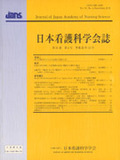Japanese
English
- 販売していません
- Abstract 文献概要
- 参考文献 Reference
要旨
目的:「ファミリーレジリエンスを育成する家族介入モデル」に基づく介入が,知的発達障害児を抱える家族のパラダイムに与えた影響を明らかにし,その実用性を検討した.
方法:1年間,知的発達障害児を抱える家族に「ファミリーレジリエンスを育成する家族介入モデル」を適用し,家族介入とその反応についてReissらのファミリーパラダイムを用いて分析した.
結果:モデルの「順応」段階では,【感情表出を促す】介入と【保健師の判断を伝える】介入により,家族は障害に対する家族の考え方に変化を起こし,家族内で対処するようになった.これにより,Reissのファミリーパラダイムは,『出来事の定義と補足情報の詮索』の段階から『初期反応と試行的解決』の段階へ展開した.モデルの「適応」段階では,【選択肢の提供】の介入により,家族が意思決定することで,家族は課題や不安を抱えることになった.その後,家族が地域の資源や同じ障害児を抱える家族とつながる【地域と家族をつなぐ】介入や【感情表出を促す】介入を行うことで,家族は,これまでのように家族内で対処するのではなく,地域の資源を家族の力に組み入れて対処することができ,家族の対処能力は拡大した.これにより,Reissのファミリーパラダイムは,『初期反応と試行的解決』の段階から『最終意思決定とそれへの関わり』の段階へと展開した.
結論:本モデルの【選択肢の提供】の介入が,ファミリーレジリエンスプロセスへのターニングポイントとして位置づけられ,【地域と家族をつなぐ】介入により,家族は地域の資源とつながりながら家族の対処能力を拡大させていた.さらに【感情表出を促す】介入が,対処行動の飛躍力へとつながる弾力性として作用していた.
Abstract
Aim:The aim of this study was to examine the applicability of a family intervention model for families of children with intellectual/developmental disabilities to clarify the influence of family's paradigm and facilitate the family resilience process.
Methods:For 1 year, I visited families of children with intellectual/developmental disabilities, for whom the intervention model was used. All communications with the families were recorded and transcribed. We analysed the changes occurring in a family using Reiss's family paradigm and examined the applicability of this model.
Results:In the adjustment phase, through interventions such as ‘encouraging expression of emotions’ and ‘following the advice of nurses,’ the families changed their views on intellectual/developmental disabilities and began to cope within the family. Accordingly, Reiss's family paradigm identified a shift from ‘Definition of the Event and Search for Additional Information’ to ‘Initial Responses and Trial Solutions.’ In the adaptation phase, interventions such as ‘offering alternatives’ forced the families to make decisions accompanied by increased anxiety and problems; however, through interventions such as ‘linking the family with the community’ and ‘encouraging expression of emotions,’ the families effectively improved their stress coping capacity. Because the family identified as coping strategies not only family's resources but also social resources. It was observed that Reiss's family paradigm shifted from ‘Initial Responses and Trial Solutions’ to ‘Final Decision or Closing Position and Commitment of the Family to This.
Conclusions:The intervention of ‘offering alternatives’ was an effective turning point in the family resilience process. ‘Linking the family with the community’ improved the stress coping capacity of these families and ‘encouraging expression of emotions’ helped families obtain a more elastic coping capacity to face challenges.
Copyright © 2011, Japan Academy of Nursing Science. All rights reserved.


